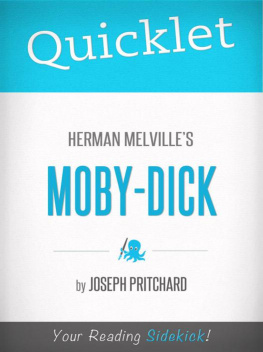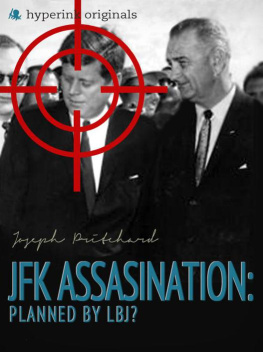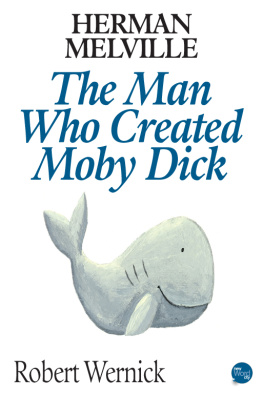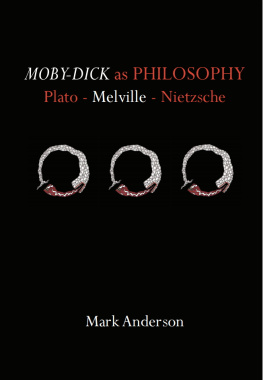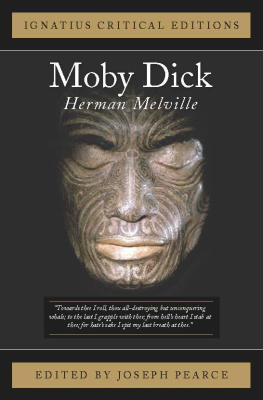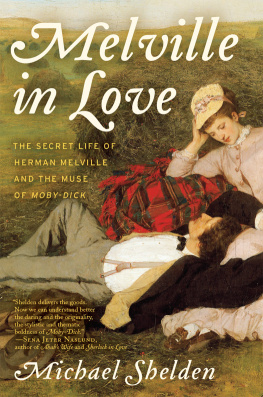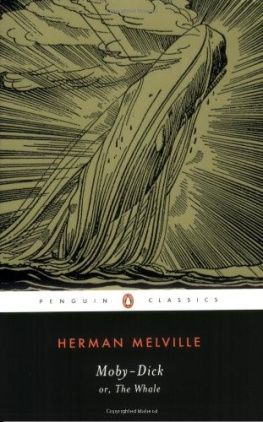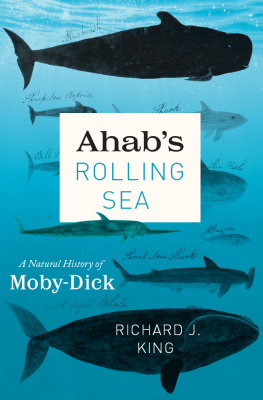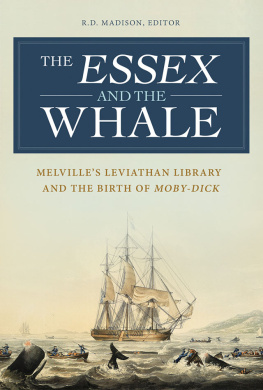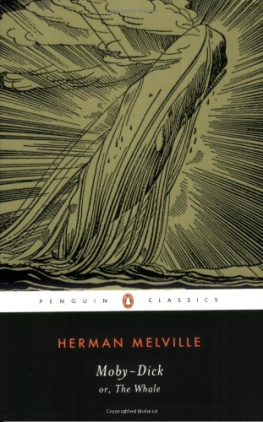Herman Melville's Moby-Dick
About the Book
From hells heart, I stab at thee These words probably best capture the overarching sentiment of Melvilles masterpiece about a vengeful sea captain and his quest to kill the white whale that took his leg. Is it any wonder that those words are so often quoted or paraphrased in books, theater, and film? Is it really worth plodding through the books 135 chapters? The short answer is: Yes".
When it was first published in the 1850s , Moby-Dick was a far cry from its current level of renown and esteem. The overarching sentiment of pre-Civil War America was certainly too bright and optimistic for a novel as dark and brooding as Melvilles book. Moreover, critics at the time panned the book as confusing, a criticism bolstered by its seemingly hodge-podge, polymorphic nature. Was it a comedy, or a tragedy? Flighty philosophical, or firmly-rooted realism? Whatever it appeared to be, it definitely wasnt a bestseller when first published.
Yet, despite its initial lackluster reception, Moby-Dick would eventually become renowned as one of Melvilles greatest achievements, albeit much of this acclaim was awarded posthumously. Ironically, the novel is renowned and praised for the very same reasons it was once panned.
Now, in the interest of full disclosure, lets make one point perfectly clear: while Moby-Dick is a thoroughly entertaining and amazing read, in no way is it an easy one. But if you have the inclination and diligence to pour over its pages and push through its archaic linguistics, then you may just gain some insights of your own. At the very least, you will have vicariously experienced a high-seas adventure that transports you to another time, when the sea was still a vast mystery to mankind.
About the Author
Before we continue discussing Moby-Dick , it is essential to know more about the author. Herman Melville was born in 1819 New York City . He was the third child of Allan Melville and Maria Gansevoort Melville. Although initially born into a family of some means, after the passing of his father, Melville was forced to work in a bank when he was thirteen to help support his family.
The young Melville was able to continue formal education until leaving school altogether when he was eighteen in order to be an elementary school teacher. But, fate would have other plans for him. A year after becoming a teacher, Melville found himself compelled to become a merchant sailor. Three years after that, he would join a whaling expedition. Melvilles life experiences strike an obvious parallelism with Ishmael, the main protagonist of Moby-Dick . It seems that the more we learn about Melvilles experiences, the more we are able to understand how he laid the foundations and basic framework of his future literary masterpiece.
After all, novels, like other creative endeavors, often reflect some facet of those who penned them. Just as Tolkiens collective life experiences helped shaped his myriad works, so to did Melvilles shape his. In fact, he would write five novels prior to writing Moby-Dick and ten more would follow after.
Yet, Moby-Dick was arguably his greatest achievement. If Melville achieved anything else in his writing of his opus, its that he has the distinction of writing something that has become so indelibly part of future eras. Captain Ahab and his cetacean nemesis have become iconic, easily recognizable even to those unfamiliar with the novel.
Overall Summary
The story begins and ends with Ishmael , a former school teacher who has come to Nantucket hoping to change his fortunes by enlisting as a sailor on a whaling expedition. So right from the get-go, there is something profoundly personal about Melvilles chosen protagonist. Ishmael seeks an escape from the profound sense of alienation he feels, and believes serving on a whaling expedition will help him create an interpersonal link.
Ishmael befriends Queequeg, a savage sailor. The two sign on to work on the whaling vessel, the Pequod. Many sailors warn the duo about the ship and her captain, but they decide to join the Pequods crew. The ominous nature of these warnings provides Melville the opportunity to foreshadow the eventual tragedy that will befall the Pequod and her sailors.
Once on board, Ishmael meets Captain Ahab, who eventually expresses his desire to slay the fabled White Whale, Moby Dick, the whale who took his leg. Ahabs hunt has become an obsession which controls every other aspect of his life. The rest of the ships crew are eager to help the captain find hide his revenge. However, the first mate, Starbuck, expresses his belief that the hunt will end in despair.
Much of the rest of the story discusses the Pequods journey into foreign seas. The crew meets a variety of other sailors who tell tales about Moby Dick. As the stories pile up, the reader gets the sense that most of the seamen consider the White While as almost a mythical, holy creature that is not only immortal, but perhaps divine.
Melville spends a lot of time discussing the complex process involved in hunting, killing, and processing whales for oil. This discussion on the mundane aspect of the Pequods business adds a sense of realism to a book that often delves into the realms of fantasy. Ishmael, the narrator of the entire book, also provides a series of lectures concerning the pervasiveness of whales in human culture, whale biology, and other technical aspects of whales. While these lectures may seem tedious, Melville is attempting to further ground his story in reality. Aside from providing new information, Melville is trying to make his story more believable. His aim was to make the reader believe that there was actually a ship called that Pequod that sailed the seven seas in search of the great White Whale.
As the hunt for Moby Dick intensifies, Ahabs madness becomes more apparent. He begins to ignore even the most obvious of priorities, which culminates in his choice to abandon another ship that is trying to find some of their lost crew. The progression of Ahabs mental instability is expertly detailed. The reader can easily imagine Ahabs behavior, rages, and desperate actions.
Finally, Moby Dick is spotted and the hunt begins in earnest. After three days of tracking the White While, the crew of the Pequod is dead and the ship itself is sunk. Captain Ahab is dragged to his death with the harpoon he fashioned to kill Moby Dick. Only Ishmael is left to tell the tragic tale of the hunt for Moby Dick.
Chapter-by-Chapter Commentary and Summary
Etymology and Extracts
The first section of Moby-Dick is a discussion on the etymology, or origin, of the word whale. In a style similar to scholarly works, Melville goes into detail about the importance of the spelling and pronunciation of whale and the how it originated from either the Swedish or German language. He goes on provide the translation of the word whale in 13 other languages.
To add to this scholarly preface, Melville adds a plethora of quotations from a eclectic selection of sources. He calls these quotations extracts, and Melville cites books such as the bible, Shakespearean plays, historical treatises, popular explorer accounts, and philosophical texts. The only common thread in all of these books is that they (in one way or another) reference whales.
By beginning his novel in such a manner, Melville indicates that Moby-Dick will not just be a pulp fiction, adventure novel, but rather a thorough narrative on a variety of topics ranging from mankinds understanding of whales to the wide range of human motivation and imagination. Melville was also attempting to show the reader that the importance of the whale in Western culture, an importance that he believed was often overlooked by the common man.

